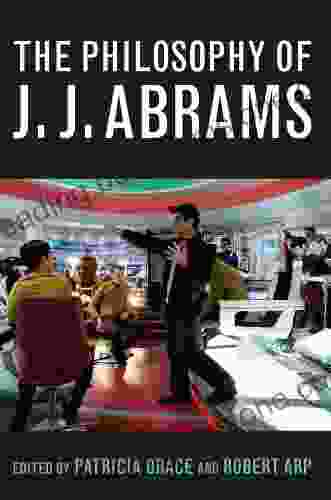The Philosophy of Abrams: The Philosophy of Popular Culture

In his new book, The Philosophy of Abrams, J.J. Abrams explores the philosophical implications of popular culture. Abrams argues that popular culture is not merely a form of entertainment, but also a way of making sense of the world. He draws on a wide range of examples from film, television, music, and other forms of popular culture to illustrate his argument.
4.7 out of 5
| Language | : | English |
| File size | : | 1702 KB |
| Text-to-Speech | : | Enabled |
| Enhanced typesetting | : | Enabled |
| Word Wise | : | Enabled |
| Print length | : | 378 pages |
| Screen Reader | : | Supported |
Abrams begins by arguing that popular culture is a reflection of our values and beliefs. He points to the way that popular culture often reflects our hopes and dreams, our fears and anxieties. He also argues that popular culture can be a source of moral guidance, teaching us about right and wrong, and about the importance of justice and compassion.
Abrams then goes on to argue that popular culture can be a source of knowledge about the world. He points to the way that popular culture often reflects the social and political realities of our time. He also argues that popular culture can help us to understand ourselves and our place in the world.
Abrams concludes by arguing that popular culture is a powerful force in our lives. He says that it has the power to shape our thoughts and feelings, our beliefs and values. He also says that popular culture has the power to bring people together, to create a sense of community, and to inspire us to change the world.
The Philosophy of Popular Culture
Abrams's philosophy of popular culture is based on the idea that popular culture is a reflection of our values and beliefs. He argues that popular culture is not merely a form of entertainment, but also a way of making sense of the world. He draws on a wide range of examples from film, television, music, and other forms of popular culture to illustrate his argument.
One of the most important ways that popular culture reflects our values and beliefs is through its portrayal of heroes and villains. Heroes are often seen as embodying the values that we admire, such as courage, strength, and compassion. Villains, on the other hand, are often seen as representing the values that we fear, such as evil, greed, and cruelty. The way that popular culture portrays heroes and villains can tell us a lot about what we value as a society.
Another way that popular culture reflects our values and beliefs is through its portrayal of social and political issues. Popular culture often reflects the social and political realities of our time. For example, the film The Grapes of Wrath (1940) was a powerful indictment of the poverty and injustice that was rampant in the United States during the Great Depression. The film Do the Right Thing (1989) was a powerful exploration of the racial tensions that were simmering in New York City in the late 1980s.
Popular culture can also be a source of knowledge about the world. Popular culture often reflects the social and political realities of our time. For example, the film The Godfather (1972) was a powerful exploration of the world of organized crime. The film The Wire (2002-2008) was a powerful exploration of the drug trade in Baltimore.
Popular culture can also help us to understand ourselves and our place in the world. Popular culture often reflects the human condition. For example, the film Citizen Kane (1941) was a powerful exploration of the American dream. The film The Shawshank Redemption (1994) was a powerful exploration of the human spirit.
Abrams argues that popular culture is a powerful force in our lives. He says that it has the power to shape our thoughts and feelings, our beliefs and values. He also says that popular culture has the power to bring people together, to create a sense of community, and to inspire us to change the world.
The Philosophy of Abrams is a thought-provoking and insightful exploration of the philosophical implications of popular culture. Abrams argues that popular culture is not merely a form of entertainment, but also a way of making sense of the world. He draws on a wide range of examples from film, television, music, and other forms of popular culture to illustrate his argument.
Abrams's book is a must-read for anyone interested in the philosophy of popular culture. It is a valuable contribution to the field and it is sure to spark debate and discussion.
4.7 out of 5
| Language | : | English |
| File size | : | 1702 KB |
| Text-to-Speech | : | Enabled |
| Enhanced typesetting | : | Enabled |
| Word Wise | : | Enabled |
| Print length | : | 378 pages |
| Screen Reader | : | Supported |
Do you want to contribute by writing guest posts on this blog?
Please contact us and send us a resume of previous articles that you have written.
 Best Book
Best Book Page Flip
Page Flip Bookshelf
Bookshelf Literary loom
Literary loom Chapter
Chapter Bookish
Bookish PageTurner
PageTurner Bibliophile
Bibliophile Story
Story Inkwell
Inkwell Bookworm
Bookworm Labyrinth
Labyrinth Plot Twist
Plot Twist Prose
Prose Paperback
Paperback Storyteller
Storyteller Sanctuary
Sanctuary Fiction
Fiction Reading
Reading Chronicle
Chronicle Read
Read Aimee Alexander
Aimee Alexander Tom Swimm
Tom Swimm Charlene Tarbox
Charlene Tarbox Francis M Higman
Francis M Higman Antony Sher
Antony Sher L Loren
L Loren Katie Daisy
Katie Daisy Paula Marantz Cohen
Paula Marantz Cohen Aleron Kong
Aleron Kong C M Muller
C M Muller John Perrier
John Perrier Peter Gray
Peter Gray Tom Wood
Tom Wood Terez Mertes Rose
Terez Mertes Rose Mary Brooks Picken
Mary Brooks Picken Roberto Lovato
Roberto Lovato Marco Livingstone
Marco Livingstone Fiona Humberstone
Fiona Humberstone Ava Reid
Ava Reid Jennifer Lilya
Jennifer Lilya John Gold
John Gold Aki Choklat
Aki Choklat Daniel Kay Hertz
Daniel Kay Hertz Alain Kerzoncuf
Alain Kerzoncuf Philip Norman
Philip Norman Graham Mcneill
Graham Mcneill Dale Olausen
Dale Olausen Stuart Taylor
Stuart Taylor Michael Weeks
Michael Weeks Paul J Pastor
Paul J Pastor Sandie Heron
Sandie Heron Cherrie Moraga
Cherrie Moraga John Varley
John Varley Magunta Dayakar
Magunta Dayakar Kelly Bowen
Kelly Bowen Bernard Cornwell
Bernard Cornwell Samuel R Delany
Samuel R Delany Adrienne Keene
Adrienne Keene Alex Kerr
Alex Kerr Fiona Maccarthy
Fiona Maccarthy William C Meadows
William C Meadows Ella Blake
Ella Blake Dustin Lynx
Dustin Lynx Alex Albrinck
Alex Albrinck Inman Learning
Inman Learning Aurora Levins Morales
Aurora Levins Morales Christian Cameron
Christian Cameron Peter Warner
Peter Warner Tracy Michaud
Tracy Michaud A J Alonzo Wind
A J Alonzo Wind J D Adams
J D Adams Colette Pitcher
Colette Pitcher Gerald L Kooyman
Gerald L Kooyman Agatha Christie
Agatha Christie Fluent In Korean
Fluent In Korean Dominique Dupuy
Dominique Dupuy Eric Sprinkle
Eric Sprinkle Lynsey Addario
Lynsey Addario Ninni Holmqvist
Ninni Holmqvist Alberto Manguel
Alberto Manguel My Daily Spanish
My Daily Spanish G J Ogden
G J Ogden Shaul Kelner
Shaul Kelner Geninne Zlatkis
Geninne Zlatkis Viola Shipman
Viola Shipman Tom Dunkel
Tom Dunkel Akiko Busch
Akiko Busch Mary Ann Shaffer
Mary Ann Shaffer Gregory Michie
Gregory Michie M Osman Siddique
M Osman Siddique Malka Older
Malka Older Alex Tannen
Alex Tannen Pam Cook
Pam Cook Aleksandr Solzhenitsyn
Aleksandr Solzhenitsyn Jennifer Egan
Jennifer Egan Sjeng Scheijen
Sjeng Scheijen Alexa West
Alexa West Michael J Fox
Michael J Fox Howexpert Press
Howexpert Press Bart Rulon
Bart Rulon Rob Stone
Rob Stone Akaisha Kaderli
Akaisha Kaderli Allison Moore
Allison Moore Roger Bennett
Roger Bennett Amanda Gorman
Amanda Gorman Albert Corbeto
Albert Corbeto Alan Dean Foster
Alan Dean Foster James Willis
James Willis David Conyers
David Conyers Hayley Mills
Hayley Mills Michael Anderson
Michael Anderson John Maloof
John Maloof F Sehnaz Bac
F Sehnaz Bac Alex Zadeh
Alex Zadeh Danielle Donaldson
Danielle Donaldson Joseph Kim
Joseph Kim Laurieann Gibson
Laurieann Gibson Ginger Zee
Ginger Zee Karl Beecher
Karl Beecher Noam Oswin
Noam Oswin Massoud Hayoun
Massoud Hayoun Robert Byron
Robert Byron Alicia Drake
Alicia Drake Margaret Mitchell
Margaret Mitchell Rich Polanco
Rich Polanco Alex Hibbert
Alex Hibbert A J Diamond
A J Diamond Giovanni Iannoni
Giovanni Iannoni Alex Kava
Alex Kava Nancy Beiman
Nancy Beiman Richard Ayoade
Richard Ayoade Jane Patrick
Jane Patrick Lavonne Mueller
Lavonne Mueller Harlow Robinson
Harlow Robinson Alex Foster
Alex Foster Jack Jewers
Jack Jewers William Gaskill
William Gaskill Ben D Over
Ben D Over Herman Wouk
Herman Wouk Charles Mccormac
Charles Mccormac Ted Okuda
Ted Okuda Gregory Benford
Gregory Benford Lama Rod Owens
Lama Rod Owens Smashing Magazine
Smashing Magazine Kimiko Kitani
Kimiko Kitani Betty Reid Soskin
Betty Reid Soskin Abdulrazak Gurnah
Abdulrazak Gurnah Paul Austin
Paul Austin Peter Burke
Peter Burke Anna M Church
Anna M Church Markus S Agerer
Markus S Agerer Alex Danchev
Alex Danchev Lauren D Schmalz
Lauren D Schmalz Peter Gethers
Peter Gethers Candida R Moss
Candida R Moss Alex Kotlowitz
Alex Kotlowitz Siddharth Anbalagan
Siddharth Anbalagan Sarah Ferguson
Sarah Ferguson Seth Kugel
Seth Kugel Richard F Weyand
Richard F Weyand Ak Turner
Ak Turner Charles Chipiez
Charles Chipiez Greg Sestero
Greg Sestero Reshonda Tate Billingsley
Reshonda Tate Billingsley Don Yaeger
Don Yaeger Aer Ki Jyr
Aer Ki Jyr Soon Y Warren
Soon Y Warren Ed Miller
Ed Miller Emily Maker
Emily Maker Martin Mosebach
Martin Mosebach R J Patterson
R J Patterson Bill Manley
Bill Manley Laurie Schneider Adams
Laurie Schneider Adams Bobby Love
Bobby Love Guy Kawasaki
Guy Kawasaki Wakefield Poole
Wakefield Poole Alan Bachmann
Alan Bachmann Alan Smith
Alan Smith Irmgard Bartenieff
Irmgard Bartenieff Simon Callow
Simon Callow Antonio Centeno
Antonio Centeno Lawrence F Lihosit
Lawrence F Lihosit Anais Granofsky
Anais Granofsky Eddie R Hicks
Eddie R Hicks Cheech Marin
Cheech Marin Michael Connelly
Michael Connelly A D Davies
A D Davies Timothy Samara
Timothy Samara Christopher G Nuttall
Christopher G Nuttall Brad Thor
Brad Thor Ntozake Shange
Ntozake Shange Ann Maclean
Ann Maclean Craig Johnson
Craig Johnson Alan M Davis
Alan M Davis Franklyn Griffiths
Franklyn Griffiths Alda Sigmundsdottir
Alda Sigmundsdottir Peter Carey
Peter Carey Gary Zacny
Gary Zacny Alex White
Alex White Lee Craker
Lee Craker Gerhard Haase Hindenberg
Gerhard Haase Hindenberg Robyn Blakeman
Robyn Blakeman Akwaeke Emezi
Akwaeke Emezi Brenda Barrett
Brenda Barrett Adeline Lim
Adeline Lim Despina Stratigakos
Despina Stratigakos Aleksandar Nedeljkovic
Aleksandar Nedeljkovic A K Duboff
A K Duboff Sarah Spencer
Sarah Spencer Alberlin Torres
Alberlin Torres Anne Thomas Soffee
Anne Thomas Soffee Sean Hall
Sean Hall Erika Hecht
Erika Hecht Torben Landskrone
Torben Landskrone Alan Laycock
Alan Laycock Richard Lloyd Parry
Richard Lloyd Parry Glyn Macey
Glyn Macey Dave Cornthwaite
Dave Cornthwaite Afia Atakora
Afia Atakora Gay Talese
Gay Talese Rocio Carvajal
Rocio Carvajal Albert Samaha
Albert Samaha Chimamanda Ngozi Adichie
Chimamanda Ngozi Adichie Bob Rohm
Bob Rohm Adrien Clautrier
Adrien Clautrier Adele P Margolis
Adele P Margolis Alastair Campbell
Alastair Campbell Frances Kai Hwa Wang
Frances Kai Hwa Wang Danie Ware
Danie Ware Kayleigh Mcenany
Kayleigh Mcenany Faith Hunter
Faith Hunter Alex Hillkurtz
Alex Hillkurtz Mark William Shaw
Mark William Shaw Anthony Doerr
Anthony Doerr Stephen Davis
Stephen Davis Learning Through Activities
Learning Through Activities A J Markam
A J Markam Andrew Solomon
Andrew Solomon Tara Ellis
Tara Ellis Susan Evenson
Susan Evenson Gary Jennings
Gary Jennings Sara Barnes
Sara Barnes Kazuaki Tanahashi
Kazuaki Tanahashi Harry Thurston
Harry Thurston Anne Macleod
Anne Macleod Judy A Bernstein
Judy A Bernstein Richard Poulin
Richard Poulin Jennifer Sewing
Jennifer Sewing Kirsten Weiss
Kirsten Weiss Lee Goldberg
Lee Goldberg Al Sharpton
Al Sharpton Alan Veale
Alan Veale Tupac Shakur
Tupac Shakur Lon Varnadore
Lon Varnadore Alan Maimon
Alan Maimon Akira Kurosawa
Akira Kurosawa Afua Hirsch
Afua Hirsch Neil Wilson
Neil Wilson Brien Foerster
Brien Foerster 3rd Edition Kindle Edition
3rd Edition Kindle Edition V A Lewis
V A Lewis Michael Booth
Michael Booth Paul Hadden
Paul Hadden Allison Pataki
Allison Pataki Jack Anderson
Jack Anderson Alex Tizon
Alex Tizon Alex Moore
Alex Moore C M Carney
C M Carney Alexa Martin
Alexa Martin Paul Clark
Paul Clark Joan Druett
Joan Druett Marco Leonel Garcia Gonzalez
Marco Leonel Garcia Gonzalez Abdul El Sayed
Abdul El Sayed Eden Dawn
Eden Dawn Christopher P Jones
Christopher P Jones Alex Wagner
Alex Wagner Robert Clark
Robert Clark Nihon Vogue
Nihon Vogue Alex Robinson
Alex Robinson Judith M Heimann
Judith M Heimann Thomas Huhti
Thomas Huhti Scott Bukatman
Scott Bukatman Arlene Croce
Arlene Croce Jeff Lieberman
Jeff Lieberman Alastair Vere Nicoll
Alastair Vere Nicoll Tom Scocca
Tom Scocca Rachael Cerrotti
Rachael Cerrotti Julian Hoxter
Julian Hoxter Alex Dudok De Wit
Alex Dudok De Wit Tyler Green
Tyler Green Grace Lees Maffei
Grace Lees Maffei Jeffrey Spivak
Jeffrey Spivak Herman Melville
Herman Melville Tim Lawrence
Tim Lawrence Rhonda K Garelick
Rhonda K Garelick Osman Yousefzada
Osman Yousefzada Greg Jenkins
Greg Jenkins Stefan Zweig
Stefan Zweig Scott Harwood
Scott Harwood Aleksandar Hemon
Aleksandar Hemon Alecia J
Alecia J Beth Alison Maloney
Beth Alison Maloney Jason Cordova
Jason Cordova Robert Condon
Robert Condon Laurie Birnsteel
Laurie Birnsteel Ajax Lygan
Ajax Lygan Richard Doetsch
Richard Doetsch Ivy Mix
Ivy Mix S Elizabeth
S Elizabeth Thomas Geve
Thomas Geve Geronimo
Geronimo Alfons Kaiser
Alfons Kaiser Sarah Polley
Sarah Polley Kerry Trout
Kerry Trout Adrian Tchaikovsky
Adrian Tchaikovsky Michael Samerdyke
Michael Samerdyke Katja Schmitt
Katja Schmitt Wes Mcdowell
Wes Mcdowell Tim Bonyhady
Tim Bonyhady A R Corbin
A R Corbin Alex Berenson
Alex Berenson Laura Galloway
Laura Galloway Diane Mierzwik
Diane Mierzwik Mia P Manansala
Mia P Manansala Alec Potrero
Alec Potrero Aileen Bordman
Aileen Bordman Nicki Grace
Nicki Grace Terry Barrett
Terry Barrett Tod Benoit
Tod Benoit Rachel Mcmillan
Rachel Mcmillan Junheng Li
Junheng Li Vinny Sagoo
Vinny Sagoo Alastair Reynolds
Alastair Reynolds Ally Morin
Ally Morin Nancy Marguerite Anderson
Nancy Marguerite Anderson Winifred Brown
Winifred Brown Ann Mah
Ann Mah Misba
Misba Al Saadiq Banks
Al Saadiq Banks Matthew Reilly
Matthew Reilly Evanna Lynch
Evanna Lynch Nancy Milford
Nancy Milford Alan Rabinowitz
Alan Rabinowitz Stephen Bodio
Stephen Bodio Alex Gough
Alex Gough Nikolaus Julius Weichselbaumer
Nikolaus Julius Weichselbaumer Ann Torrence
Ann Torrence Amy Tan
Amy Tan Hob Osterlund
Hob Osterlund Fanny Kelly
Fanny Kelly Jeanne Filler Scott
Jeanne Filler Scott Gail Pool
Gail Pool Bradley Wright
Bradley Wright Francisco Martin Rayo
Francisco Martin Rayo Ella Frances Sanders
Ella Frances Sanders Alejandro Jodorowsky
Alejandro Jodorowsky Frank Catalano
Frank Catalano John Gonzalez
John Gonzalez Martin Edge
Martin Edge Roxana Robinson
Roxana Robinson Aeham Ahmad
Aeham Ahmad Giannalberto Bendazzi
Giannalberto Bendazzi Kim E Nielsen
Kim E Nielsen D K Holmberg
D K Holmberg Alan Verskin
Alan Verskin Masahiro Kasahara
Masahiro Kasahara Matt Dickinson
Matt Dickinson Luciano Thomazelli
Luciano Thomazelli Living Languages
Living Languages Claudia Rankine
Claudia Rankine Hans Keilson
Hans Keilson Alan Carr
Alan Carr Monica Russel
Monica Russel Eliane Strosberg
Eliane Strosberg Anne Vipond
Anne Vipond Michelle Loucadoux
Michelle Loucadoux Christoph Brueck
Christoph Brueck Veronica Sekules
Veronica Sekules Alistair Urquhart
Alistair Urquhart Laurel Hart
Laurel Hart Louise Erdrich
Louise Erdrich Heidi Moksnes
Heidi Moksnes J R R Tolkien
J R R Tolkien Andy Steves
Andy Steves Adrien Gombeaud
Adrien Gombeaud Michael Reyes
Michael Reyes Eileen Sorg
Eileen Sorg Stefano Mancuso
Stefano Mancuso Mary Karr
Mary Karr Harold Holzer
Harold Holzer Alan Grainger
Alan Grainger Georgia Purdom
Georgia Purdom Robert Marshall
Robert Marshall Alan Colquhoun
Alan Colquhoun P T Books
P T Books Roland Nyns
Roland Nyns Alex Grey
Alex Grey Rudy Rucker
Rudy Rucker Elizabeth Mcpherson
Elizabeth Mcpherson Joseph Campbell
Joseph Campbell Garret Romaine
Garret Romaine Adele Wagstaff
Adele Wagstaff John French
John French Saleem H Ali
Saleem H Ali K J Gillenwater
K J Gillenwater Peter Samuel
Peter Samuel Alan Murphy
Alan Murphy Danny Newman
Danny Newman James Baldwin
James Baldwin Stuart Thornton
Stuart Thornton Rozsika Parker
Rozsika Parker Natasha Boyd
Natasha Boyd Felix R Savage
Felix R Savage Tamara Thiessen
Tamara Thiessen Jessica Lee
Jessica Lee George Smith
George Smith Kindle Edition
Kindle Edition Gareth C Meadows
Gareth C Meadows Geert Mak
Geert Mak Jeffery H Haskell
Jeffery H Haskell Emilie Conrad Da Oud
Emilie Conrad Da Oud Max Eisen
Max Eisen C N Phillips
C N Phillips Keila Rowe
Keila Rowe Yahtzee Croshaw
Yahtzee Croshaw Maturin Murray Ballou
Maturin Murray Ballou Akiva Teddy Macleod
Akiva Teddy Macleod John Phillip Santos
John Phillip Santos Linda Bloomfield
Linda Bloomfield Matt Ortile
Matt Ortile Matthew Bourne
Matthew Bourne D Rus
D Rus Adrian Dater
Adrian Dater Amy Latta
Amy Latta Geoff Hann
Geoff Hann Sherry Turkle
Sherry Turkle Edmund Morris
Edmund Morris Haroon Moghul
Haroon Moghul Chloe Garner
Chloe Garner Al Davidson
Al Davidson Adam Nayman
Adam Nayman Amanda Lawrence
Amanda Lawrence Eric Goldberg
Eric Goldberg Charles De Lint
Charles De Lint John Ingledew
John Ingledew Michael Sayman
Michael Sayman E C Godhand
E C Godhand Jean Pederson
Jean Pederson Robert Arp
Robert Arp Ken Layne
Ken Layne Bill Dixon
Bill Dixon Jim Hinckley
Jim Hinckley Naughty Dog
Naughty Dog Alejandra Viscarra
Alejandra Viscarra Josh Holliday
Josh Holliday N Dia Rae
N Dia Rae Cassia Cogger
Cassia Cogger Aimee Nezhukumatathil
Aimee Nezhukumatathil Armond T Joyce
Armond T Joyce Cecil Jenkins
Cecil Jenkins Jesse Wente
Jesse Wente Mark Christopher Weber
Mark Christopher Weber A E Filby
A E Filby Josh Golding
Josh Golding Dima Ghawi
Dima Ghawi Christian Stoll
Christian Stoll James S A Corey
James S A Corey Ramy Vance
Ramy Vance William Golding
William Golding George Bernard Shaw
George Bernard Shaw Elizabeth Holmes
Elizabeth Holmes Yvvette Edwards
Yvvette Edwards J Pal
J Pal Samantha Downing
Samantha Downing Mark Panek
Mark Panek Ricardo Victoria
Ricardo Victoria David Morrell
David Morrell 1st Edition Kindle Edition
1st Edition Kindle Edition Chip Kidd
Chip Kidd Patrick J Flannigan
Patrick J Flannigan Cynthia D Yoder
Cynthia D Yoder Troy Taylor
Troy Taylor Robin Meloy Goldsby
Robin Meloy Goldsby George Monbiot
George Monbiot Mariusz Krukowski
Mariusz Krukowski Rian Hughes
Rian Hughes Rosa Park
Rosa Park Mary Monroe
Mary Monroe Alex Jennings
Alex Jennings Justin Monroe
Justin Monroe Nikki Giovanni
Nikki Giovanni Jennie Allen
Jennie Allen Alejandro Zambrano Sevillano
Alejandro Zambrano Sevillano Alan Jacobson
Alan Jacobson Julie Collins
Julie Collins Sabrina Devonshire
Sabrina Devonshire Keisha Ervin
Keisha Ervin Randy Palmer
Randy Palmer Nicolas Sellens
Nicolas Sellens Sarah Crafts
Sarah Crafts Juhea Kim
Juhea Kim Fadel Abuelula
Fadel Abuelula Margaret Shepherd
Margaret Shepherd Michele Bousquet
Michele Bousquet St Paul S Greek Orthodox Church
St Paul S Greek Orthodox Church Paul Hallas
Paul Hallas Albert Woodfox
Albert Woodfox Dave Addey
Dave Addey A J Verdelle
A J Verdelle Barbara Brownie
Barbara Brownie Anne Glenconner
Anne Glenconner Richard Hunt
Richard Hunt Luke F D Marsden
Luke F D Marsden Heather Hutchison
Heather Hutchison Adam Roberts
Adam Roberts Alan Sanders
Alan Sanders Belinda Smith Cicarella
Belinda Smith Cicarella Kathleen Brady
Kathleen Brady Russell Staiff
Russell Staiff Julian Bell
Julian Bell Albert Blasco Peris
Albert Blasco Peris Donna Digiuseppe
Donna Digiuseppe Tom Weaver
Tom Weaver Azalea Ellis
Azalea Ellis Shelli Marie
Shelli Marie Marian Filar
Marian Filar Robert M Kerns
Robert M Kerns Jack L Grossman
Jack L Grossman Huma Abedin
Huma Abedin A J Liebling
A J Liebling Aisha Sabatini Sloan
Aisha Sabatini Sloan Bernard Diederich
Bernard Diederich Jessica Fanigliulo
Jessica Fanigliulo Anita Friedman
Anita Friedman Andrew Morton
Andrew Morton Paul Curry
Paul Curry
Light bulbAdvertise smarter! Our strategic ad space ensures maximum exposure. Reserve your spot today!

 Brent FosterAliens: The Official Movie Novelization: A Spine-Tingling Adaptation of the...
Brent FosterAliens: The Official Movie Novelization: A Spine-Tingling Adaptation of the...
 Houston PowellFrommer's EasyGuide to Ireland 2024: The Ultimate Guide to Ireland's Top...
Houston PowellFrommer's EasyGuide to Ireland 2024: The Ultimate Guide to Ireland's Top... Ed CooperFollow ·12.4k
Ed CooperFollow ·12.4k Bo CoxFollow ·17.7k
Bo CoxFollow ·17.7k Leo TolstoyFollow ·10.6k
Leo TolstoyFollow ·10.6k Tyrone PowellFollow ·6.9k
Tyrone PowellFollow ·6.9k Hamilton BellFollow ·13.7k
Hamilton BellFollow ·13.7k Gabriel MistralFollow ·14.5k
Gabriel MistralFollow ·14.5k Forrest BlairFollow ·4.3k
Forrest BlairFollow ·4.3k Chris ColemanFollow ·8.8k
Chris ColemanFollow ·8.8k

 Stephen King
Stephen KingJudge This: The Unforgettable Book Covers of Chip Kidd
Chip Kidd is one of the most...

 Curtis Stewart
Curtis StewartSovereignty, Security, and Stewardship: Interwoven...
The geopolitical landscape of the 21st...

 Jay Simmons
Jay SimmonsOnly What Necessary: The Ultimate Guide to Minimalist...
Unveiling the Transformative...

 Austin Ford
Austin FordMaster Your Cricut Maker: Unleashing the Power of Design...
Embracing the Cricut...
4.7 out of 5
| Language | : | English |
| File size | : | 1702 KB |
| Text-to-Speech | : | Enabled |
| Enhanced typesetting | : | Enabled |
| Word Wise | : | Enabled |
| Print length | : | 378 pages |
| Screen Reader | : | Supported |












